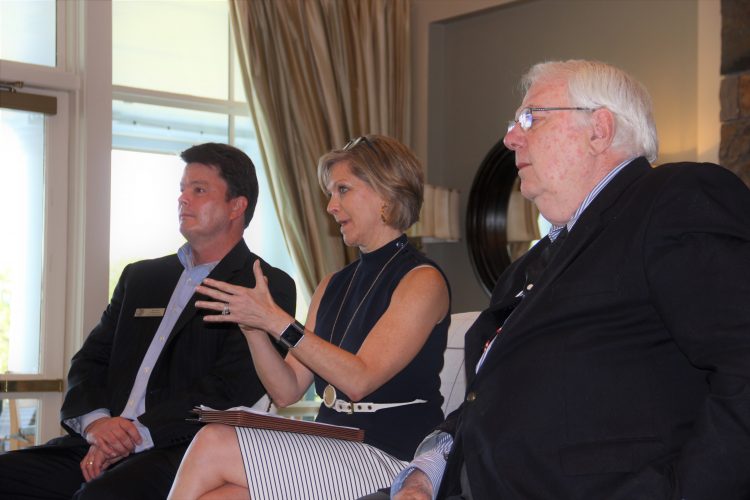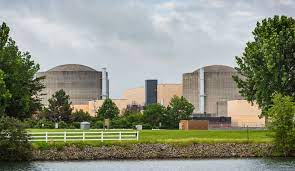
Pictured are Kurt Naas, Karen Bentley and Jim Fuller
By Erica Batten. North Mecklenburg leaders say Charlotte-Mecklenburg Schools responded “in a retaliatory way” after Cornelius and Huntersville opted into HB-514, leaving open the possibility of opening municipal charter schools. CMS officials recently revealed that capital expenditures from the $922 million bond passed last year would go to towns that had opted out.
“We were a bit blindsided,” said former Mecklenburg County Commissioner Karen Bentley, speaking at the Sept. 26 NewsMakers Breakfast on charter schools hosted by Cornelius Today and Business Today.
Cornelius signed on to the bill with no real intention of establishing a municipal charter school, said Cornelius Mayor Woody Washam.
Pushed into a corner
“But we wanted it as an option down the road,” Washam said. “My opinion is that we were pushed into doing something.”
The bond covers construction and renovation for the next 15 years.
Both CMS and town officials must address the imminent need for new school buildings in northern Mecklenburg County. Huntersville currently has 5,000 new housing units approved for construction; Davidson has 2,000. Cornelius has 400, though roughly half of those are age-restricted and unlikely to affect student enrollment
Its geographical situation between the two other lake towns, however, means that Cornelius would still feel the crunch, if it isn’t already. Hough High School is currently at 116 percent capacity.
Huntersville Commissioner Mark Gibbons said the population boom around Lake Norman leaves local leaders with limited options when it comes to schools.
They can do nothing, leaving decisions in the hands of the school system. They can work with CMS to try to make schools smaller and more manageable. They could partner with private charter schools.
Or, they can create municipal charter schools, which are supported by town taxes and offer preferential admission to town residents.
That’s the option established by HB-514, which passed into law in June. The bill was introduced by NC Rep. Bill Brawley of Matthews last year amidst similar pressures from population growth in Charlotte’s southern suburbs.
The new law differentiates municipal charter schools from state charter schools, which must use random lotteries to determine enrollment regardless of where students live.
Opponents of municipal charter schools say they create segregated student populations, partly because the schools can limit enrollment to town residents, and partly because charter-school students often have to provide their own transportation.
Bentley was one of a group of parents who sued CMS in the late 1990s to release the school system from court-ordered desegregation. The parents said race-based policies were unduly affecting decisions on where schools were built and which students were assigned to them.
Overcrowding not new
The concern about overcrowding is not new, Bentley said. “This could have been a conversation that we were having around the table 20 years ago,” she said.
Panelist Jim Fuller, a Davidson commissioner, said that municipal charter schools would be an “almost insurmountable burden” to town governments, particularly in Davidson whose population is only 12,000.
Traditionally, schools require buildings, a full complement of faculty and staff, a nutrition program, athletics and other extracurricular activities, in addition to transportation.
However, many of North Carolina’s 173 charter schools—a number that has nearly doubled since the state lifted its charter school cap of 100 in 2012—start off quite meagerly, often with nothing more than one mobile unit and a handful of teachers.
Unlike traditional public schools, state charter schools have no curriculum requirements and no restrictions on classroom size or the school calendar. They are not required to provide free and reduced-price meals to students from low-income families. Only 50 percent of charter school teachers must hold a license.
However much charter schools differ from traditional public schools, demand is often quite high. According to nonprofit organization Public Schools First NC, charter school students comprise almost 7 percent of North Carolina’s total public school population.
The area’s three major charter schools have a waiting list of more than 12,000 students, Cornelius Commissioner Kurt Naas said.
Unlike its neighbors, Davidson voted against opting into municipal charter schools.
Mayor Rusty Knox pointed out that although North Mecklenburg schools are not receiving proportional funding from the latest CMS bond, eight new schools were built with funding from the last four bond packages. He said this fight would not have taken place if CMS had asked for what it really needed in the bond referendum last year —$2 billion for new schools, not $922 million.
He and Fuller were in agreement around sticking with CMS and continuing to lobby for facilities in North Meck.
“Davidson is a town that is committed to education,” said Fuller, who is the husband of a public school teacher. “We thought 514 was not the way to go. Our board agrees with our mayor that CMS is doing a good job, but we can pitch in and make it better.”
The Presenting Sponsors of the Newsmakers Breakfast were Dixie Dean and Christina Stone, Realtors at Allen Tate. The Breakfast Sponsors were First National Bank and Master Title. Coffee Sponsors were Davidson Wealth Management, Hood Hargett Insurance and KS Audio Video.





